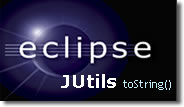-
How do I install the plugin? Installing this plugin is
similar to installing many other eclipse plugins.
Download the archive distribution and extract it to some
convenient location such as the desktop.
Close Eclipse if already open. Open the eclipse installation directory.
Inside this directory you should be able to see another directory
called plugins. Get into plugins directory.
If you had not installed any previous version of this plugin,
just copy the extracted plugin into this directory and start Eclipse.
If you had a previous version installed, you need to clean it up before
the new one can take effect. Close Eclipse. Delete the previous plugin
from plugins directory. Start and close Eclipse again. Now, copy
the new version into the plugins directory and start eclipse using
the command line option
-clean. - How do I verify if the plugin is installed? Simple. You can check it in two ways. Firstly, you can go to Window >> Preferences and over there, you should be able to see a new preference page called JUtils. Secondly, you can open any Java source file in Java Perspective and on right clicking on the code area, you should be able to find a new entry in the context menu, called JUtils. Usually, this context menu entry will be located at the end.
-
I installed the plugin properly but can't see it anywhere: This can
happen sometimes. All you have to do is close the IDE and start it using the
-cleanoption from command line. -
How do I use the
-cleanoption?-cleanis a command line switch for the eclipse.exe executable. To use this, you have to open your command prompt/shell and navigate to the Eclipse installation directory. From there, type eithereclipse cleanoreclipse -clean. That should start the IDE. -
How will the
-cleanoption help? Eclipse stores lot of workspace specific data in local file system for better performance. When a new version of some plugin is installed, it's quite possible that the new version is using the plugin specific data such as preference stores created by the older version. To clean this up and aid recreation of preference stores, the-cleanoption is recommended. - JUtils? JUtils stands for Java Utilities, a name coined purely out of personal fondness to the Java Programming Language.

|
FREQUENTLY ASKED QUESTIONS
|